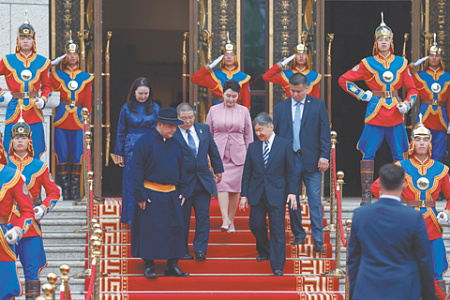
In a significant diplomatic move, Japan’s Emperor Naruhito has embarked on a state visit to Mongolia, a landlocked nation strategically positioned between Russia and China. The visit is widely seen in Tokyo as a pivotal opportunity to bolster Japan’s influence and reinforce Mongolia’s status as a nation pursuing a foreign policy independent of its two powerful neighbors. This objective aligns closely with the interests of Japan’s key military ally, the United States, as Tokyo subtly signals its intent to support democratic development in the region.
At the heart of the seven-day visit, which includes a meeting between Emperor Naruhito and Mongolian President Ukhnaagiin Khurelsukh, are pressing economic interests. Japan is eager to expand its economic ties with Mongolia, a country rich in coal, copper, and other vital minerals. Japanese corporations are particularly focused on gaining access to Mongolia’s vast natural resources, especially rare earth metals, in a strategic bid to diversify supply chains and reduce their current heavy reliance on Chinese exports.
However, the trip is deeply layered with historical symbolism. A key moment was the Emperor laying flowers at a memorial for Japanese soldiers who were taken as prisoners by Soviet forces at the end of World War II and died in labor camps in Mongolia. This solemn ceremony carries a dual meaning: a gesture of reconciliation for past conflicts and a tribute to Japanese lives lost far from home. This act stands in stark contrast to the legacy of the 1939 Battle of Khalkhin Gol, where Soviet and Mongolian troops decisively defeated invading Japanese forces, an anniversary recently commemorated by a visit from Russian President Vladimir Putin.
Since its democratic transition in the early 1990s, Mongolia has skillfully pursued a “third neighbor” policy, seeking to balance its deep-rooted ties with Moscow and Beijing against burgeoning relationships with Washington and its allies, Japan and South Korea. While maintaining friendly relations with Russia, Ulaanbaatar views Japan as a crucial partner and a model of an Asian nation that achieved modern industrial development. This visit by the Emperor serves to reaffirm Mongolia’s place within Tokyo’s strategic vision for Northeast and Central Asia.
The mission extends beyond hard geopolitics into the realm of soft power. The visit is framed as a meeting between two friendly democracies, reinforced by tangible Japanese support, such as aid for water supply and sanitation systems in Ulaanbaatar—a project aligned with the Emperor’s personal interests. Furthermore, strong cultural affinities, exemplified by the immense popularity of Japanese sumo wrestling in Mongolia, create a foundation of mutual respect and interest that strengthens the bilateral relationship.
